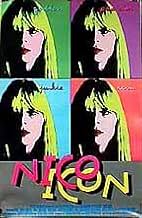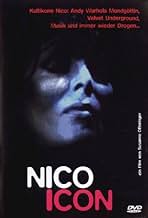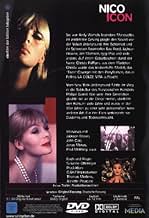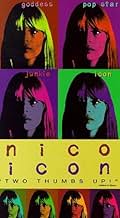A look into the many lives of Christa Päffgen, otherwise known as Nico; from cutie German mädchen to the first of the supermodels, to glamorous diva of the Velvet Underground, to cult item, ... Read allA look into the many lives of Christa Päffgen, otherwise known as Nico; from cutie German mädchen to the first of the supermodels, to glamorous diva of the Velvet Underground, to cult item, junkie and hag. Many faces for the same woman, whom, you realize, just couldn't bring hers... Read allA look into the many lives of Christa Päffgen, otherwise known as Nico; from cutie German mädchen to the first of the supermodels, to glamorous diva of the Velvet Underground, to cult item, junkie and hag. Many faces for the same woman, whom, you realize, just couldn't bring herself to care enough to live.
- Awards
- 4 wins total
- Self
- (as Ari Boulogne)
- Self
- (as Nico Papatakis)
- Director
- Writer
- All cast & crew
- Production, box office & more at IMDbPro
Featured reviews
This said, it is indeed true that it is not that representative, and that the "whole" it constructs might not exactly be Nico. But still. Indeed, there is a lot of focus on negative aspects of her life, but then again, you can hardly find a career of 6 studio albums and some unfinished material for a potential new one in the span of 20 years prolific, can you? And it is a fact that, while before she got hooked on H she recorded 3 albums in 3 years (two of which were astonishing pieces of unheard of music that she wrote entirely by herself), once she got addicted her creativity went downhill, if not as much in quality than in quantity. The touring became a way of bringing home the bacon, while performing the same songs over and over again. In an impressive way, alright, but still the same. Frequent touring is no substitute for creativity. Look at what John Cale has been doing for the last 15 years. He has accomplished some impressive creative feats, true, but a lot of his stuff is soundtrack-muzak and the shows are copies of his first solo shows in the early 80's.
But back to the documentary. Indeed, more unique footage would have been welcome and the complete omission of Drama of Exile is unforgivable. Furthermore, this story would have clearly illustrated how deep downhill it had gone, since Nico sold the incomplete master tapes because she needed the money (guess what for) - and they recorded a second version. But still, it's negative. With the Lutz Ulbrich-interview you get the impression that they leave a lot out of the picture and instead focus on the point where Ulbrich says he can't understand how a mother could introduce her own son to the needle (true...). What about Ulbrich's involvement in her last show (on cd as Fata Morgana), for which she seemed to have taken a new start, with wonderful new material!
What's more important, it does not, apart from a few things, shed any light on the why and how of Nico's oeuvre. And this may indeed be a very difficult task, mainly because Nico was not exactly an art-explainer, which is good. That's why one might say that this documentary, as a provider of information on Nico, falls short. The beauty was in the music, and it was and is exactly its force that it needs no further explanation. Furthermore, the docu will leave fans unsatisfied and will not gain Nico a new audience, for with her music it's simple: you love it or you hate it to bits. And anyone open to its unworldly beauty will inevitably find it, documentary or not. The others will keep away, and this docu will not change their minds.
But, after all, it's nice that at least a documentary is made on her. It would be greater still if in some future, the excellent interviews would be used by someone else to make a real, full documentary, with a focus on the work and its evolution, and not on her personality problems, for though they were part of the process, they were no part of the results.
First of all, the movie is only 67 minutes long and ends too abruptly. Another half-hour of more extensive interviews would have greatly strengthened the film. Maybe people like Lou Reed or the surviving members of The Doors simply refused to take part in the movie, but the absence of their opinions leaves definite holes in the story. In the film's defense, maybe there's just not much elaboration anyone can give about Nico--she was pretty, had a striking voice, and was a depressive junkie; that about sums up the impression I'm left with (which probably isn't all the film's fault!). But couldn't they have at least given us Lou Reed's take on Nico, even if it was only via anecdotes shared by others?
The creation of her solo songs & albums is very glossed-over. Suddenly Andy Warhol's crew is talking about hearing a single of Nico's--the viewer is left to wonder, "Well, when & how did that recording come about?!" We are shown pictures of her solo albums while clips of her songs are played, but that's about it--no real discussion of the circumstances surrounding the writing, recording, promotion, dates of release, etc. It's left unclear how much of the actual CREATION of those songs was done by Nico herself--did she learn to play any instruments, did she direct other music writers to produce what she was envisioning? Maybe these things were addressed and I simply missed them, but if so, it was a sentence or two at most, which might have been inaudible--
--which leads us into the problem of the poor sound quality; the music sometimes drowns out the poorly recorded interviews, so that when the interviewees lapse into softer voices, mutters & mumbles (their various accents add to this problem), it can be very hard to understand what is being said. Also annoying is the cheesy method of occasionally superimposing words on the screen as they are spoken by interviewees or sung by the soundtrack. This technique feels cheap and superficial--like a commercial trying to convince us that what is being said is important or deep.
Overall, it's definitely worth seeing if you like documentaries & music/pop history, but not a great documentary by any means. I'm almost tempted to go back and change my vote to 6, but I think I'll leave it at 7 because I did enjoy watching it. Worth renting, but not worth owning.
On the other hand,we hear Edith Boulogne, actor Alain Delon's mother talk for a long time of her grandson Ari -who appears himself too- .There was a world between Nico, an avant-garde artist and a simple woman such as Mrs Boulogne who complains "cause she was always feeding him with crisps ".The boy seems to despise his grandma who raised him though.
In his biography of Delon (2000),(I do not know if the book has been translated into English) Bernard Violet devoted the end of a chapter to Nico's son: "Le cas "Ari Boulogne" ".
Did you know
Details
Box office
- Gross US & Canada
- $306,691
- Opening weekend US & Canada
- $14,763
- Sep 10, 1995
- Gross worldwide
- $306,691






























